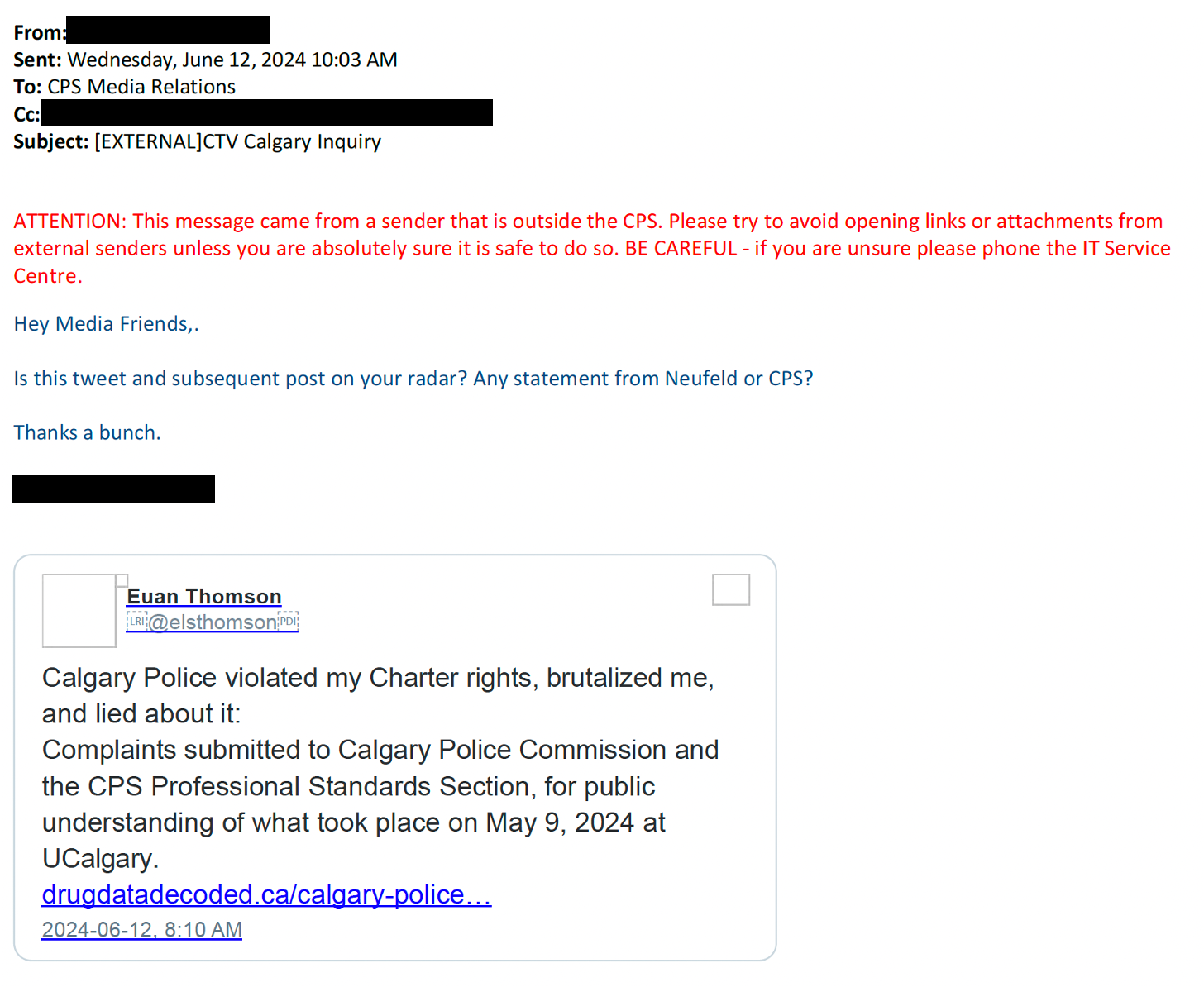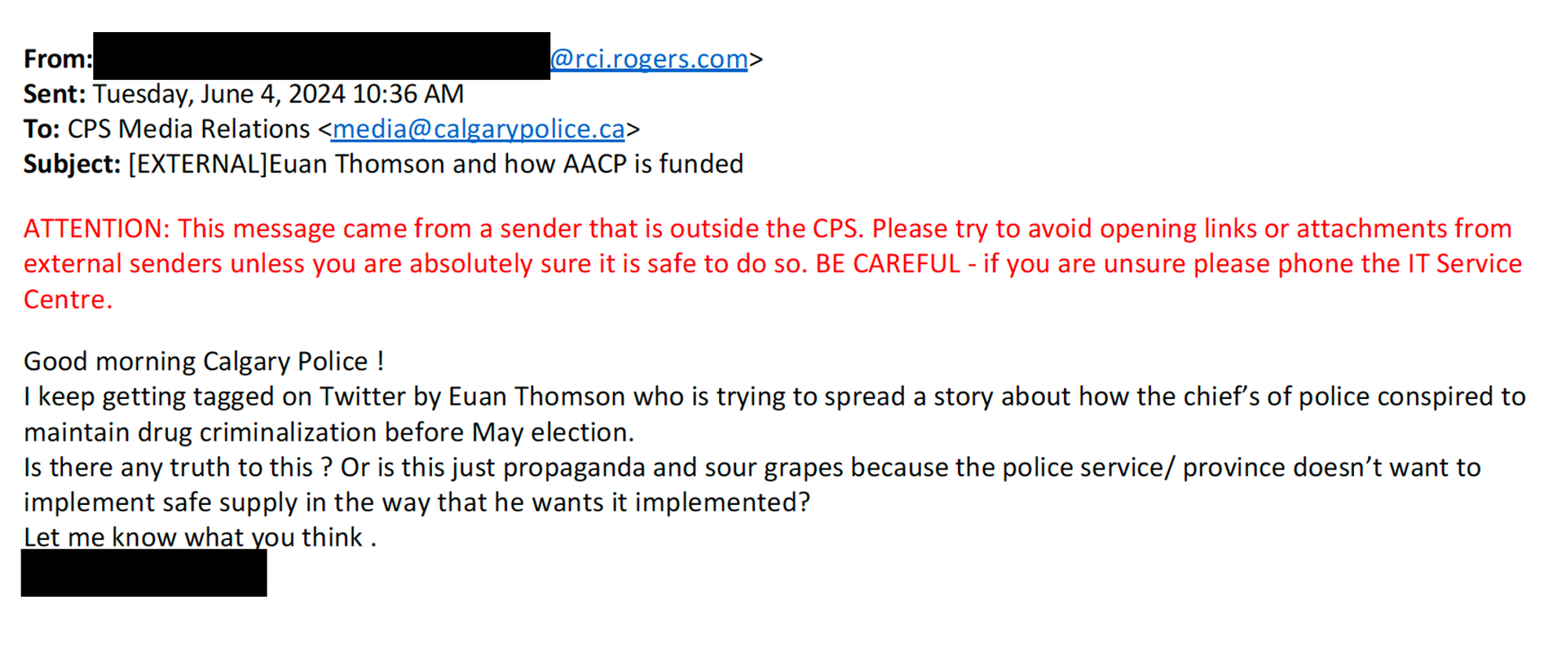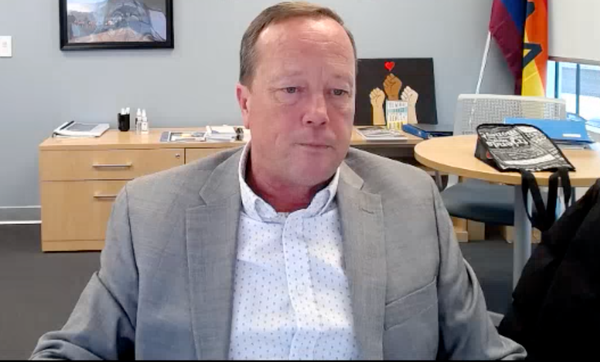Calgary Police Commission skips deceit investigation as cops & press get cozy
Calgary police oversight is in crisis. Police commission failed to investigate alleged deceit by the chief for a year before dropping the files upon his resignation, which media have seemingly given up trying to explain. Meanwhile, emails reveal bias of corporate media toward police narratives.

In June 2024, a month after Calgary police issued beatings and arrests to anti-genocide demonstrators at the University of Calgary, activist for Palestinian rights Annette Lengyel, as well as this author, submitted complaints to Calgary Police Commission alleging wilful deceit by then-police chief Mark Neufeld that whitewashed brutality by dozens of his officers.
After confirming receipt of Lengyel's complaint, the police commission never confirmed that her complaint was being addressed, despite a follow-up attempt in September. However, on May 23, 2025 — three weeks after Neufeld and two of his five executives resigned without public explanation — the commission provided its first and only response to this author's complaint:
“You may be aware that Mark Neufeld recently resigned his position from Calgary Police Service. As he is no longer employed by CPS, the Calgary Police Commission no longer has jurisdiction over any complaints made against him under the Police Act. The Calgary Police Commission will now consider this matter closed."
In short, there would be no investigation. As far as the police commission was concerned, Neufeld’s resignation foreclosed the chance to hold him accountable.
A heavily redacted internal police commission email sent by the Public Complaints Director on May 20, 2025 indicates considerable confusion about the complaint and how the commission should handle it. It lists three complaints against the chief in 2024, including one "from Euan Thomson [that] is not proceeding as we are awaiting ASIRT."
As Jeremy Appel reported in March, the ASIRT investigation was an apparent cover-up of the police brutality, coordinated from the office of the premier. That 'investigation' was dropped by ASIRT in October 2024. In any case, the complaint of deceit against the chief was a separate matter, to which the police commission alone was accountable.
![There were [REDACTED] complaints against the Chief in 2024, as follows: 1 was a [REDACTED] complaint. 1 was from Euan Thomson and is not proceeding as we are awaiting ASIRT. 1 was [REDACTED PARAGRAPH]. In all cases, I will reach out to let the citizens know that CPC no longer has jurisdiction. [REDACTED PARAGRAPH]. Let me know if you need more info.](https://drugdatadecoded.ca/content/images/2025/07/Screenshot-2025-07-08-at-7.13.56---PM.png)
Lengyel feels that her complaint was botched by the commission. "With the chief resigning, there's no accountability. It wasn't just the chief – it was the whole system."
"If the police could assault us like that in the first place, I don't think any of us truly believed that there would be any justice done."
These events echo findings by CBC News detailing resignations of 50 CPS officers since 2012 who were under investigation for misconduct — a move that halts the disciplinary process and allows them to find work in another police force. While CPS refused to provide misconduct details to CBC, Edmonton police revealed that deceit was the second-most common violation for which 38 of its officers were investigated at the time of their retirement.

The commission's closure of the Neufeld file following his abrupt retirement raises the question of whether it took any action to examine the details of the complaints he faced in the eleven preceding months.
To answer this, Drug Data Decoded submitted a freedom of information request to the commission asking for all records related to the complaint, including "a list of all documents reviewed by Calgary Police Commission members in pursuing the complaint, and any reports or other documents as they stood at the moment of former Chief Neufeld's resignation."
On July 3, the police commission revealed that no reports, correspondence, meeting notes or any other document had been produced on the matter since the complaint was submitted a year previous.
The freedom of information request was assigned file number 2025-01. This reveals that it was the first request to Calgary Police Commission in 2025, even though it was submitted five weeks after the chief's resignation. The chief of police reports only to the police commission, meaning the most direct path to information about his resignation should be the police commission.
So, while Calgary Police Commission stands in breach of its duty to "handle complaints regarding the Chief of Police," this instance calls into question why Calgary media have not critically examined the police executive resignations. Since the May 23 reporting by CBC on the commission's refusal to disclose severance details, there has been no reporting on the resignations.
Drug Data Decoded awaits a second freedom of information response from Calgary Police Commission with records related to the chief's resignation.
Calgary Police Commission was asked on July 8 whether it was typical for complaints against the chief to go unexamined for nearly a year, but no response was provided. [UPDATE July 10: Commission responded - the full text of its response and the response to that is provided here.]
Lengyel told Drug Data Decoded that "it became very clear from attending commission meetings that they were not there for oversight – they were there to protect the chief and protect the system."
"They violated their own mandate – it's like they're an interference body to protect the police from the public, rather than the other way around."
The police commission has already rejected public transparency on the resignations. Three weeks after they were revealed, CBC News reported that the commission refused to disclose whether Neufeld received a severance package. Mount Royal University professor Lori Williams told CBC, "the fact that there aren't any answers forthcoming does lead to speculation that something untoward occurred."
The ongoing failure of Calgary press to explain or even publicly discuss the mysterious decapitation of the city's police force over the last 45 days reflects broader observations of how policing gets covered in the news.
In his new book copaganda: How police and the media manipulate our news, American civil rights lawyer Alec Karakatsanis describes the symbiotic relationships built by police PR teams with daily news reporters. These enable reporters to meet tight deadlines by having police prepare materials, line up police-approved interviewees and shape how stories are relayed to the public.
Linking this pattern in part to the decline in funding for journalism, Karakatsanis allows that "busy reporters... thus fall into place, generating daily streams of copaganda because it is the path of least resistance."
As they fall in line, access journalists are expected to skew the news in favour of police – or risk losing access.
As suggested by a separate freedom of information response from CPS, access journalism is a visible component of Calgary's daily news ecosystem. Emails show a degree of familiarity between CPS and reporters at CityNews and CTV that does not align with media's mandate to hold public bodies to account.

In one instance, a CityNews reporter emailed CPS about a widely circulated Drug Data Decoded story on strategy documents showing how Alberta police forces, including CPS, used public resources to hold town halls and publicly lobby to maintain drug criminalization in alignment with the UCP platform, carefully timed with the 2023 provincial election.
But instead of reading the story or requesting the documents underpinning it, the reporter played footsie with CPS by bringing it to their attention and then brushing it off on their behalf as "propaganda and sour grapes" about the unrelated public health topic of safer supply.

The media question period held at the end of the March 26 Calgary Police Commission meeting further clarifies the reluctance of Calgary media to pursue police accountability work. During public questioning, then-Chief Neufeld was confronted with Jeremy Appel's story detailing an apparent cover-up of the police brutality against protesters at the University of Calgary. Conversations related to this cover-up included the chief, the provincial public safety minister, and the premier's chief of staff discussing a potential Alberta Serious Incident Response Team (ASIRT) review in which the chief was assured that the police watchdog "won't investigate" the brutality claims.
Neufeld also went on record in this session contradicting his June 2024 assertion that broken ribs and concussions constitute "serious injuries," now claiming that concussions are not serious, in response to University of Calgary doctoral student Katy Anderson asking about her own injuries sustained at the hands of the police. A question by this author asked the chief whether CPS was monitoring people's social media in the run-up to the G7 Summit – a matter that Drug Data Decoded later reported as a systemic breach of privacy law by CPS.
Despite CityNews and CBC being present for the media segment that immediately followed these exchanges, when the commission chair offered them time to ask questions, both outlets declined.
The Alberta government is proceeding against public will to install its provincial police force as direct competitor to Calgary's municipal force. Calgarians are being told by their police commission to accept a bare minimum of oversight, a dynamic that will no doubt be amplified in an organization directly governed by the notoriously secretive and coercive provincial government.
Meanwhile, key figures in daily crime reporting cozy up to a police service that has killed at least eleven citizens in fifteen years, shielded abusers who rise to power, undermined employees' mental health in favour of indoctrination and covered up the investigation, permitted sexual violence within its ranks and possible stalking of citizens by officers, illegally surveilled citizens, silenced whistleblowers, secretly violated the safety of drug-using citizens and lobbied to keep them criminalized, misled the public on its ethnic and racialized composition, and assaulted protesters, assaulted protesters, assaulted protesters.
"It's easy to become cynical, given my own experience with the commission, what we hear from others like [former CPS director of HR] Angela Whitney – commission did nothing about all that harassment and abuse. Commission just feels like a place to go and bang your head against the wall."
"Why bother, if they're putting you through all this grief, without so much as an acknowledgement that – that they fucked up?"
While Calgarians remain in the dark about whether any of these scandals prompted the resignations of half their police executive, they should prepare for worse under the secretive, coercive and industry-led hand of a provincially directed force.
If you have additional information on this story, please get in touch at info@drugdatadecoded.ca, where media can also request documents related to this story.
An early version of this story was shared with paid subscribers on July 8 and the full version was shared publicly later that day.
Drug Data Decoded provides analysis using news sources, publicly available data sets and freedom of information submissions, from which the author draws reasonable opinions. The author is not a journalist.





